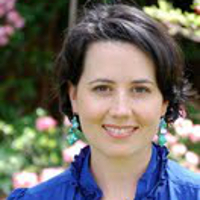
Thank God for this job, otherwise I’d be in jail or dead, at the rate I was going.”
-Chris, age 17
Some teens find the Closer to Earth youth community gardens through school, some through court-ordered community service. Some are volunteers, but many have been in some trouble with the law, earning them the term “at-risk youth.” At risk for what? “Hanging out with gangs, on the street, with nothing to do,” says Chris, one of the current interns.
Chris and Antoinette are both interns with Closer to Earth, a non-profit group of youth who wear many hats: community gardeners, composters, native-plant landscapers, growers of fresh veggies for food pantries to feed the hungry. Interns and youth doing court-ordered community service learn how to garden without chemicals, how to compost, make healthier choices, and advocate for the environment. Schools and courts refer hundreds of youth to Closer to Earth for community service every year because these institutions have found that the safety, education, and responsibility that youth find at this small grassroots non-profit can be an effective antidote to their “at-risk” alternatives.
The group has won several awards, most recently the 2011 Keep Oklahoma Beautiful Environmental Excellence Award in the Youth category. It was founded in 2007 in the Central Park Neighborhood by Allen Parleir, and although Allen may be the facilitator for the group, according to him, “The kids make all the decisions.” This is part of a model he calls Growth through Responsibility, and he credits it, along with the close contact with nature, with the success of the group.
 Chris and Antoinette spoke with me about how being involved with Closer to Earth has changed their lives and the lives of the juvenile offenders that they mentor.
Chris and Antoinette spoke with me about how being involved with Closer to Earth has changed their lives and the lives of the juvenile offenders that they mentor.
The transformations range from subtle to amazing. Antoinette, a high school senior, has learned teamwork, speaking skills, and how to be aware of her choices. She has also learned not to judge the juvenile offenders for their past troubles. “I want to start a youth group, when I have the resources. Everyone should have the opportunity to participate in a group like this…I like being closer to nature. I like caring.”
For some, the changes are striking. Chris reports, “I used to eat a lot of junk food, greasy fried chicken, McDonald’s. Nasty stuff. I used to weigh 298 pounds. Now, I’m down to 225. It’s all that hauling the wheelbarrows around that does it.”
But he says the changes run deeper. “Before, I was rude. I had a real bad anger problem. I used to work fast just to get things done. Now, Allen taught me how to stay calm. I’ve learned to take my time, do it right. I lead the check-ins and the group meetings where we have discussions about writing grant proposals. I’ve learned to be a leader.”
What keeps the teens coming back? The nominal monthly stipend helps, but Chris and Antoinette expressed appreciation for working with nature and helping improve the world. For Chris, Closer to Earth is like a family, and he values the opportunity to serve. “I love it. My favorite part is helping the homeless people – feeding them and talking about what we do. I like to see them smile.” Antoinette has found that caring for plants and being outside has brought her some peace. “With the simplicity of nature, I can enjoy the little things without needing some other kind of escape. I’ve learned how to be chill.”
Both Chris and Antoinette agree that Closer to Earth’s most important activity is working with the juvenile offenders, helping grow community and providing a way for them to stay out of trouble. While these two interns are only seventeen and eighteen, they have the opportunity to mentor and teach the youth who are doing court-ordered community service every Sunday and Wednesday. Antoinette says, “At first, they’re very quiet, uncomfortable, shut down. But within a week, they start to like it. They lighten up, get an appreciation for what they’re doing for the world. They get a clarity.”
Chris reports that the work with Closer to Earth has a real impact on the teens. “It changes their whole attitude. They start to take responsibility. Most of them, when they get through, want to come back and work some more. It’s a cool thing, to be able to reach out and touch their lives like that.”
***
Like Closer to Earth? Want to help? You can donate to the youth group, community garden and compost service through Grassroots Groupon until Earth Day, April 22. Transition OKC is using 100% of donations to build compost bins and purchase badly needed tools and equipment for their garden and composting activities. And since Groupon works through the power of the people, please spread the word through e-mail, Facebook and Twitter!






